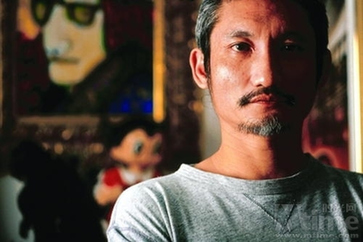|

Tsui Hark injected all his experience to make the 3D "Flying Swords of Dragon Gate."
The 3D martial arts motion picture "Flying Swords of Dragon Gate" by Hong Kong film maestro Tsui Hark debuted in the Chinese mainland on Dec. 15, 2011, and had already earned more than 346 million yuan ($54.9 million) in domestic box office receipts as of Dec. 27.
The good box office performance and positive audience feedback have been encouraging for its producer, Bona Film Group Limited, a leading film distributor in China. But for the director, the making of his first 3D film is the realization of a decades-long dream.
Born and raised in Saigon, Vietnam, in a large Chinese immigrant family with 16 siblings, Tsui got his first chance to see a stereoscopic movie when he was seven years old. With little money in their pockets, boys like Tsui who wanted to see films had to think up crafty ways to slip into the cinema.
"I often walked closely with an adult who had a ticket in his hand, and sometimes, if the ticket examiner mistook me as the man's son, I could enter the cinema without getting into trouble," recalled Tsui.
The film that impressed him most during that time was called "Shi San Ci Gui," which required a pair of red and green glasses to watch, but "it was actually a handcrafted 2D film without much stereo effect," said Tsui.
From then on he showed an early interest in films. At the age of 10, he and some friends rented an 8 mm camera to film a magic show they put on at school.
When he was 17, Tsui immigrated to Hong Kong with his family, but because he was not fluent in Cantonese and had almost no friends, he often took refuge at the cinema.
It was there that he saw the film "Yojimbo" by Japanese director Akira Kurosawa. The film shocked Tsui and made him finally decide to make filmmaking his lifelong career.
Tsui proceeded to study film in Texas and graduated from the University of Texas in Austin in 1975. He got his first chance to shoot a nine-episode wuxia TV series in 1977 in Hong Kong.
The TV series put him in contact with famous Hong Kong movie producer Ng See-yuen, who gave Tsui the chance to make his first martial arts film "The Butterfly Murders" in 1979. "At that time, we had no computerized special effects, and every movement in the film had to be made by the actors themselves," said Tsui.
In 1997, to catch up with the development of technology, Tsui remade his 1987 film "A Chinese Ghost Story" into a 3D animated film called "Xiao Qian." "The 3D films that we talked about during the last century were different from what they are today. What we called 3D film was just computer animation," said Tsui.
In 2001, while having coffee with some Hollywood friends, Tsui heard that James Cameron and some other directors were preparing to shoot 3D films. Once again, Tsui thought that he should catch up with the new 3D era. Returning to Hong Kong, he threw himself into making "The Legend of Zu."
The magic martial arts film was extravagantly produced with lavish computer-generated imagery that gained cult admirers, but finally proved not to be the 3D film that Tsui wanted to make.
In 2010, during promotion for his new film "Detective Dee and the Mystery of the Phantom Flame" in Taiwan, Tsui saw James Cameron's "Avatar" by chance. He spent a sleepless night after seeing the film, trying to figure out what kind of 3D film he really wanted to do.
In the next two months, Tsui traveled to many places in search of people familiar with doing 3D films, but came up disappointed. He learned that after "Avatar," Cameron hadn't promoted the 3D filming technique to the movie industry, which means that in the United States, Japan, South Korea or Hong Kong, there was no mature industry for making 3D films.
But Tsui didn't stop pushing the technical boundaries and revising old favorites. He found Chuck Comisky, photographic director of "Avatar," and, after a long conversation, they signed a contract to remake Tsui's famous 1992 movie "New Dragon Gate Inn" into a 3D film.
Injecting $35 million, Tsui hired a team with experience in making 3D films from Europe, the United States and Asia, and appointed Chuck to be the visual effects director.
"During the making of this film we encountered many unexpected difficulties. We had 1,058 special effects shots and hired 11 special effects companies to cope with them, and it also brought many troubles to the actors," said Tsui.
"Each time, I had to think of the reaction of a man hit by three swords coming from different directions to finish a fighting move," said Jet Li, the famous martial arts actor.
The shooting time was longer than expected, but the final result comforted Tsui. "I had injected all of my experience into this movie, and the techniques and experience I gained from it will be introduced to others to help promote 3D films in the whole industry," said Tsui.
"The excitement of watching the film brought me back to the time when we first got the chance to watch films in cinemas in China," said Jia Zhangke, a renowned Chinese director. "Tsui had succeeded in combining 3D with wuxia films."
Ecns.cn
|


